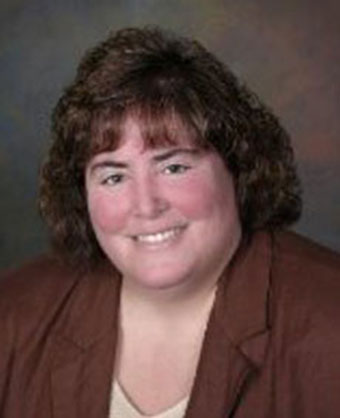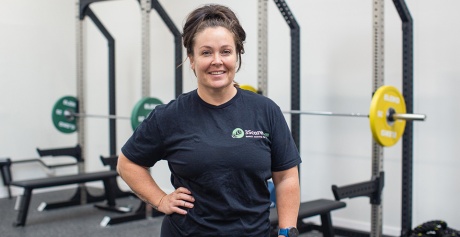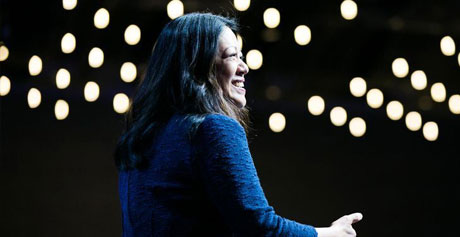She Will Navigate You Through the Emotions to a Better Solution An Experienced Attorney Who Understands Your Needs. Meet Silicon Valley Attorney Sandra J. McManus
 Q: When did you know you would pursue a career in the legal field?
Q: When did you know you would pursue a career in the legal field?
SM: This is a funny story. My mom tells people that I always wanted to be an attorney (especially since she hasn’t won an argument with me since I was 3 years old) but I remember only deciding to go to law school in my last year of college. She is actually correct because in my sophomore year of high school we started looking at colleges that had a “Law & Society” major which tells me that I was gearing for a career in the legal field – whether as a lawyer or in some other legal field.
Q: What is your own background and experience?
SM: I started working in the legal field as a Legal Secretary between my 3rd and 4th years of college and then when I was attending law school. After I graduated from law school, I began working as a paralegal while I was waiting to pass the bar. The last firm I worked at as a paralegal promoted me an Associate Attorney once I passed the bar. I worked there for about 6.5 years (both as a paralegal and attorney) before branching leaving and starting my own firm. I have been an attorney for over 25 years now and my firm has been opened for 20.5 years.
In addition to working as an attorney, I also teach a Family Law class at Lincoln Law School in San Jose. It is an elective class for the students and is a practical class. Basically, I teach them what it is like to be a family law attorney. We cover everything from working for a firm to opening your own practice; how to get clients; plus we cover the majority of the areas of family law as we can in the 10 week course ending with a mock trial where the students are assigned roles such as parents, attorneys, minor children and experts.
Q: Can you share with our audience the type of cases you generally handle?
SM: As a family law attorney, I handle cases involving divorce; paternity; child support; spousal support; custody; visitation; property division; domestic violence and civil harassment restraining orders; Guardianships; as well as I also offer Mediation services. I am also court appointed to represent minor children in custody disputes and I volunteer as a certified Temporary Judge on the court’s Settlement Conference and Settlement Officer Conference calendars.
Q: What is your approach or philosophy to winning or representing a case?
SM: There is no clear “win or lose” in family court unless there is a clear-cut issue that is a “yes or no” type of issue. Most of the time, both sides feel that they have lost in some way or another even when the results may be 75% in their favor. My philosophy, and how I conduct my practice, is to try to resolve things with as little pain to my clients as possible. For example, in cases with custody disputes, I always look out for the best interest of the child primarily even when that may not be fully what my client wants. When I explain that what I am proposing is based on what is best for the child developmentally based on their age and needs my client will usually appreciate my honesty and my looking out for their child. I will fight for my client’s rights without fail but sometimes it is better to settle than to let a child suffer or cause the client to have to pay thousands of dollars on litigation to only gain an inch. If a reasonable settlement cannot be reached, then I will litigate and fight for my client’s rights 110%.
Q: What was your first job? How did it shape or impact you?
SM: My first job was actually as a babysitter back when I was 11 years old. I continued to babysit kids into my adulthood actually (while in college) and while working other jobs. I always wanted to take care of children and had thought about doing child psychology as a career path for a quick second before deciding fully to go to law school. I think my involvement with children from such a young age has made me a tougher advocate when representing minor children in custody disputes. The impact of a custody fight on children can be devastating – especially when the parents are only fighting for what they want and not what is in the best interest of the children. That is why I will agree to be appointed to represent children so that I can make sure what is best for the children are adhered to.
Q: Can you tell our audience one of your most memorable moments your career?
SM: That’s a tough one when you’ve been practicing for over 25 years. There are so many to choose from. My most memorable one was when I first became a “Judge Pro Tem” or Temporary Judge as we are called now. Normally an attorney has to be practicing at least 5 to 10 years before they can become a temporary judge (the years of practice requirement depends on what calendars you serve on). I was only an attorney for 5 months when I was asked by the Court’s Settlement Officer (who was then called an Early Disposition Conference Officer) to serve as a Settlement Conference Pro Tem Judge on a case. I was working for a firm at the time where I was a paralegal at first and then an attorney when I passed the bar (Robin Yeamans & Associates). I used to attend “EDCs” (now SOCs) with Attorney Yeamans to assist her in cases both while I was a paralegal and then as an attorney.
When I was asked to be a Pro Tem, it was during an EDC that I was attending with Ms. Yeamans. I mentioned that I had only been an attorney for 5 months but the EDC Officer (now retired Commissioner John Schroeder) said that I “knew what I was doing” and that if I got stuck on something that he would be there to answer any questions or I could call Ms. Yeamans. I was so touched by the faith they both had in me, so I agreed to serve. I settled the case without needing to call on either Commissioner Schroeder or Ms. Yeamans and I have been acting as a Temporary Judge ever since.
Q: What’s one lesson you’ve learned in your career that you can share with our audience?
SM: That your reputation means everything. I have worked very hard over the years to have a reputation as an ethical, fair and honest attorney while also being very direct and not playing any games. My goal is to resolve my client’s case without costing them an arm and a leg. As a result, I am very honest and direct with them as to how I think a Judge is going to rule on their case and whether or not it is worth the money pursuing an argument or position just for the sake of litigating. I believe most attorneys and the Judge feel that I have a very good reputation for being ethical, fair and honest and I continue to work hard to maintain that reputation.
Q: What are some of the challenges you feel women face today?
SM: I believe pay in the workplace is still a huge issue. I know women that work for firms and they are not paid the same rate as the male attorneys. I also think that in the litigation world, some Judges will discount what the mother has to say because they feel she is being emotional and histrionic when it comes to issues such as domestic violence. We still have some mothers that picket the family court because they feel that they have been wronged where domestic violence and custody issues are concerned. Some Judges are not fully educated (especially when they are first new to the family law bench) on the effects of domestic violence on how the victim (whether male or female) may react or testify in court. You hear the phrase “he said/she said” a lot in DV cases when no police reports are filed, or arrests are made and then the Judge has to make a judgment call on credibility after hearing both sides testify. If a victim is perceived as being too emotional or not emotional enough, the court may not find them to be credible. It is a tough situation.

Q: What advice would you give to young women who want to succeed in the workplace?
SM: Work hard and do not let the fact that you are a woman stop you from succeeding. There are so many more women now that have paved the way to becoming partners in firms and Judges. Follow their lead. Be strong and do not take any harassment from anyone (mainly other attorneys). The family court bar, over the last 25 years has changed a lot in that regard. When I first started as an attorney in 1994 there was definitely an “Old-Boys Network” where if you had an opposing counsel that was part of that group, he was given different treatment than a new (mostly female) attorney would be given. Most of those men have retired although there are a few still practicing BUT the Judges’ assignments change every few years and so those on the bench now, for the most part, will go out of their way to treat everyone as equal. I’m not saying there aren’t Judges out there that still treat a male attorney different than a female attorney but I’m seeing that less and less as time goes on. As an example, we used to have one Judge (who has since retired) who’s face used to light up when certain male attorneys walked through the door to her courtroom. She would not act the same when a female attorney walked through the door to her courtroom. It was an obvious behavior to most attorneys. That was over 10-15 years ago, and the Judges have been educated on bias, so we do not see those type of issues for the most part now.
Five Things About Attorney Sandra McManus
1. If you could talk to one famous person past or present, who would it be and why?
John F. Kennedy. First, I grew up in Massachusetts before moving to California as a teen. Second, President Kennedy was amazing. He started the Peace Corps and appointed Sargent Shriver to head the organization; he pushed for and obtained financial support for the space program which allowed us to be the 1st nation to put a man on the moon (and look at our space program today – men AND women of all colors, nationalities and religions are astronauts); the 1st Freedom Ride occurred during his term (supported by the Congress of Racial Equality); Segregation in transportation facilities was deemed unconstitutional; the whole Civil Rights movement started during his term.
I am a big proponent of civil rights and equality among all people regardless of race, religion; sexual preference; gender etc. I would have loved to have the opportunity to talk to President Kennedy to hear his true feelings on those issues as well as to hear what his opinion would be today as to how he felt that nation was doing where equality was concerned (or not going under the current times). I would love to have known how he would have felt about same sex marriages and transgender issues. Equality has gone so far beyond a “black and white” thing as it was back in 1961. To know how he would feel now about these issues and about immigration and the treatment of migrants would be amazing.
2. What’s your favorite part of the day?
My favorite part of the day is the evening. I am a night owl. I will often work late into the evening but when I get home its “me” time and I will watch TV; play games on my phone; talk or visit with family and friends. Of course, I still receive a text message or two from clients, but I try to focus on my time so that I can have some stress-free time if possible.
3. If you were a superhero, what would your special powers be?
Speed (like the Flash). He’s not my favorite superhero but I would love to be able to be able to work at a pace where I could get through my work quickly and have more time to do other things. You can only type so fast (and I type over 120 words per minute) and when you have a lot of briefs to draft or motions and declarations to draft it puts you behind in other work. I hate being behind in work, which is why I work late into the evenings sometimes. So, speed would be a great special power to have.
4. What app can’t you live without?
Google. I look up things on Google all the time! If I need to review a case, I put the name into the Google search engine, and it brings it up. If I need to look at a code, it goes into Google search engine and up it comes. Granted I have books and I can go to the library to research case law, but it is so much easier to use google.
5. Cake or Pie?
Cake! Buttercream frosting is the best!

